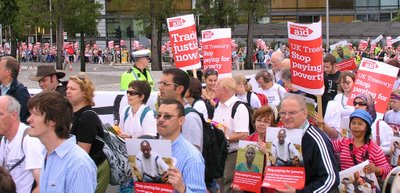This year I´m working with African Network and Forum on Debt and Development (AFRODAD). When I´m observing the latest international summits unfolding, from the G8 in St. Petersburg in July to the World Bank and IMF annual meetings in Singapore last week, it strikes me that from an African perspective one must feel a bit sidelined this year. While 2005 was the year when celebrities like David Beckham and Brad Pitt pledged to make poverty history, when 15 million people wore white bands, and when more than a billion people gathered in front of the their TV-sets for Live8, 2006 seems to be a bit of an anti-climax. As was reflected in editorials in some African newspapers during this summer´s G8 meeting: - It´s the G8 meeting, but where is Angelina Jolie? Last year Africa was in the spotlight and on the catwalk. This year Africa seems, in lack of better ways to put it, somewhat out of fashion.
Under any circumstances this would be a reason for concern, but in many ways this lack of attention comes at a time, in particular, when public pressure on issues like third world debt, conditionalities, and reform of the international financial institutions (IFIs) need to escalate, rather than evaporate. While the pledges made at Gleneagles where far from sufficient, some processes were started during last year that needs to be kept at the forefront of public attention. First there is the issue of debt relief, but other critical developments are also unfolding as we speak. Some governments are now calling for reform of World Bank and IMF conditionalities, there is a big row over the anti-corruption strategy of World Bank president Paul Wolfowitz, in the IMF developing countries are demanding a greater say and Gordon Brown said earlier this year that the institution´s legitimacy depend on it, the World Bank is currently trying to delay their own promised study on the issue of illegitimate debt, and, finally, the inconsistency of the good governance agenda promoted by the IFIs have been put at open display in Singapore last week. For those of us who are advocating for change in these institutions, this is the time to let our voices be heard.
That´s also why the civil society actions referred to on this blog are so important. Next year the G8 is returning to Germany, eight years after 50.000 people made, what in those days were seen as, groundbreaking calls for debt cancellation. Since then campaigners have made significant progress, but also been victims of politicians´ spin. As debt relief has become mainstream, it has become difficult for the public to distinguish campaigners´ call for debt cancellation and politicians support for debt relief. This year, and the coming year, we should make sure we tell a story that distinguish us from the people we are to influence. A story that distinguish charity from justice. A story that is calling, not only for the cancellation of unpayable debts, but also the cancellation of illegitimate debts. And a story where we support Southern governments´ right to repudiate such debt. It´s a story where we, as JDC and other groups, call for rich country governments and IFIs to cut the strings. And it´s a story where we, as Christian Aid did last week, call for our governments to hold back their funding to the IFI until they accept radical reform. By telling such a story we could create a broader and more long-lasting momentum for change - a momentum that goes beyond the celebrity hype.
Friday, September 29, 2006
Africa on the sideline
Thursday, September 28, 2006
Southern campaigners at the LSE
Wednesday September 27, 2006: London School of Economics
Topic: Economic Justice - Next Steps for South and North?
Speakers:
Ibrahim Hamani Souley, Coalition for African Alternatives on Development, Mali
Wahu Kaara, Director, Kenyan Debt Relief Network
Caroline Pearce, Jubilee Debt Campaign
Ibrahim Hamani Souley spoke about conditions attached to debt cancellation in Mali.
Wahu Kaara: 'debt is a tool of domination'.
Labour Conference - Wrap Up
We’ll it’s all over but for the recriminations, all the glad rags put away till next year. So what was it all about from our perspective, what did my first Labour Conference in Manchester achieve? When will my feet feel normal again?
Busy certainly, so many events on the fringe; even with the Internet and emails I still missed some of them. All too short and rushed. If Ministers appeared they were rushing off to their next appointment before the networking/dialogue. The march was of course stimulating; many of the events were a chance to meet old friends and campaigners. So, good for us for ‘bonding’ and seeing our NGO’s organisation and pulling power.
But in terms of influence on policy, debate, campaigning? Not from the fringe meetings. Good PR for the party selling their message. Good to demonstrate to them we are still here. I have to hope that inside the security barriers there was some actual dialogue, some pressure for progress. But if the media’s reflection of the conference is anything to go by, there was only one topic being discussed in huddles.
However sceptical that sounds, Hilary Benn has to be congratulated, he was everywhere (on the fringe). He defends his position with some conviction and compared to many countries does have much to be proud to tell us. And he as good as admitted DfID were wrong to make TV adverts promoting privatisation of water and there aren’t many Ministers who ever admit mistakes.
I thought his defence of EPA’s was insulting (the proposed new European Partnership Agreements that are the new focus for Trade Justice Campaigning in the autumn). The developing countries can’t just walk away if they are not in their interests.
In my opinion we need to work on a different format to these fringe events. Currently the panels spout their mantras and then there are few quick, often garbled questions and a rushed response. It doesn’t break through the communications barriers; challenge the assertions. What might be worthwhile is a one on one or at most three person, real debate. A Minister, a NGO lobbyist and an activist say, having a dialogue, challenging each other. Of course a much narrower agenda, but a chance to get through the spin.
In terms of progressing the debt campaign, the fringe meetings didn’t make any impact. On the other hand, time and again when Ministers or speakers wanted anything positive to say on International Development, it was the achievements on debt cancellation that were their flagship.
What next? Well for me, as the nights draw in and it gets cold and wet, this conference has convinced me that I need to put together the evidence and the arguments that extend debt cancellation to all poor countries struggling to meet the Millennium Development Goals and build on the one area where campaigners can show real solid progress – debt cancellation.
Tuesday, September 26, 2006
A Big Cry for Another World!
Yes it was wonderful to meet Dave, right from the airport to his house and subsequently having dinner with him: a good human bond and understanding was my experience. Perhaps there is something noble in Economic Justice activists - bridging the global gaps and manifesting the world we all dream of, a just world, a world we all belong to and a world we all have responsbility to in stewardship: this is what Dave and I were experiencing and demonstrating during this historical experience in Manchester - a big cry for 'Another World'!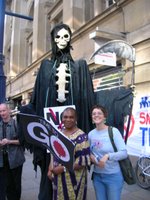 We called for 'Another World' as the peace march brought thousands and thousands of people to Manchester to visibly and loudly make their statement. And as also the mothers, wives, families of those who died and are dying in Iraq brought their position, asking: Why? Why had they to die? This reminded me of us mothers of political prisoners in 1992, also expressing the same question at Freedom Corner, Uhuru Park in Kenya. What a connection of history of injustices! But also of resistance to the injustices. Talk of women and their role in history: they have never been left behind. The peace march involved the whole of society: men and women, young and old, children, boys and girls and them with their ability which we make the mistake of calling disability!
We called for 'Another World' as the peace march brought thousands and thousands of people to Manchester to visibly and loudly make their statement. And as also the mothers, wives, families of those who died and are dying in Iraq brought their position, asking: Why? Why had they to die? This reminded me of us mothers of political prisoners in 1992, also expressing the same question at Freedom Corner, Uhuru Park in Kenya. What a connection of history of injustices! But also of resistance to the injustices. Talk of women and their role in history: they have never been left behind. The peace march involved the whole of society: men and women, young and old, children, boys and girls and them with their ability which we make the mistake of calling disability!
Freedom and justice for Palestine: oh yes, but we need to call a spade a spade and not a big fork. With USA imperialism out of Middle East, then we have a lasting solution! Israel is but a proxy stooge for American interests, which are to plunder the resources of Middle East people in the name of 'democracy'! Democracy from America = OCCUPATION, and all people of good will should be able to stand with facts and historical realities as they are.
Then what? It was a good march, but a good mobilisation needs organisation for long term ACTION, if it is to be instrumental in achieving the social transformation that has brought us here to Manchester. We must organise and mobilise for action, not just to make a statement.
We must take this window of opportunity of linking North and South to create a critical mass for a paradigm shift. The World Social Forum gives us the space and opportunity. So here we go with our banner: JUSTICE FOR ALL - ECONOMIC JUSTICE NOW. That is, peoples' destiny should be in their hands and not subject to corporates' designs. We have unity of purpose and strength to engage with the profit motive which threads the injustices for us in Africa through aid conditionalities, unjust trade and a debt burden which is death to us and our children.
JUSTICE FOR ALL is not negotiable for us women of Africa because we have refused to die for AFRICA. We are living for Africa within our alternative 'life economy' which no might can destroy. The future belongs to us and is in our hands as we build a Jubilee social economy. Thank to you Jubilee Debt Campaign UK for enabling me to have this experience here in Manchester!
Another World is not only possible, but is already in the making.
Wahu Kaara
24/09/06
Monday, September 25, 2006
Hilary Benn's day on the fringe.
JDC Blog Monday 25th – Labour Conference
Today was mainly footslog leafleting delegates about fringe events and two panels both featuring Hilary Benn. To be up-front, debt didn’t actually feature at either event whilst I was there.
Tearfund held an interesting fringe event on water with both Hilary Benn and a speaker from Thames Water. It covered all the usual ground emphasising how critical water is to achieving any of the Millennium Development Goals. Great to learn more. What stood out for me was that Thames had withdrawn from direct involvement (and many other privatised concessions), but was working with others including Halcrow (famed within WDM as water privatisation consultants) to create a group to target populations that were being bypassed. They’re called Water and Sanitation for the Urban Poor, web site www.wsup.com and I look forward to reading more about their work. Hilary Benn attacked the sterility of the public/private contest with passion. Even so it came up in questions, along with the competition for water between use by people rather than industry or agriculture.
I could only stay for the first 40 mins of International Questiontime. He (Hilary) defended EPAs (European Partnership Agreements being negotiated on trade between Europe and developing regions) on the assertion that if they didn’t like them all they had to do was not agree. This almost insults us. Under current WTO agreements, developing countries enjoying trade preferences could be challenged. They have to negotiate an alternative. And they negotiate under immense pressure in many areas. Elsewhere I though his defence of the use of consultants was credible (but he didn’t address why they were ‘western’ consultants), his response on arms control less convincing. He also had to defend Peter Mandelson, quite a challenge with the trade negotiations stalled.
I can’t imagine these events influenced policy at all. But fair play to Hilary Benn, he was prepared to go out and defend his position with pride and indeed confidence. And whisper it quietly, he as good as admitted that funding adverts for water privatisation wasn’t DfIDs finest hour!
Bit shorter?
(Photos: Chris Worrall)
Sunday, September 24, 2006
Debt cancellation for 70 countries now!
JDC Blog Sunday 24th labour Conference
Sunday, the day after the big event, the slog of the Alternative Conference and the Gordon Brown oratory to look forward to.
I had at least hoped the Alternative Conference would attract a big crowd of potential targets to leaflet for either the Palestine Fringe meeting on Tuesday or the WDM Water for Life film show on Wednesday. The main speakers at the first session were the usual suspects led by George Galloway, but most of those going in were leaving and wouldn’t be in Manchester for the fringe events.
Wahu was on the panel for the Globalisation, Trade and Debt workshop. David Hillman covered Tobin Tax, or mainly the sheer scale of financial transactions that are neither taxed nor beneficial to the poor. I did learn that France and Venezuela have agreed to introduce an airline tax to fund international development. That’s been the French alternative to Gordon’s IFF initiative and David Hillman saw it as a step towards an international Tobin tax.
The one area of consensus across the panel was the importance and significance of the World Social Forum as a vehicle for developing new ideas and social models. The next WSF is going to be in Wahu’s hometown of Nairobi. The first WSF to be held in Africa and perceived as a beacon of hope for a new world order.
The ‘main event’ today, at least from a debt perspective was the Gordon Brown session organised by Oxfam and Unison carrying the title of Millennium Development Goals and Public Services. I was looking forward to this as a self confessed Brown supporter on poverty issues. He was the first politician I ever heard, back at the closing session of J2K who I felt actually believed in what he was saying on poverty. But it’s more than that. I’ve grown to recognise and respect his tactics. So much of politics is calls for grand solutions and unachievable goals. Politics is the art of the possible. Ask the world to jump a big hurdle and they agree but do nothing. Take it in six steps and although it takes longer, progress is made. On debt, there was HIPC and HIPC II, and then the step of UK cancelling bilateral debt, then the step of putting repayments from conflict countries into a trust fund, then 100% for 20 countries. Now even signs of pressure on conditionalities. Compare that to the rhetoric on the Doha round, an all-encompassing negotiation, which has got nowhere.
So it was his usual hectoring style, full of idealisms. It was, given its sponsors, mainly about delivering free education and healthcare from public services and how, when countries bring their plans forward, the resources will be found (examples from GAVI on vaccinations and the IFF initiative). He spanned history from the birth of Trades Unions in Manchester and the abolition of slavery to show that the power was with the people and how we must continue after MAKEPOVERTYHISTORY. A speech of a grand vision for a better world and importantly some achievable steps along the way.
I was listening intently for a commitment on debt. Last year up here in Manchester his speech called for 62 countries to get debt cancellation, but it wasn’t in the printed text or web site. I tried to get a recording but in the end never did. So I wanted to know what he might say this time. 70 countries! At least the 62 seemed to relate to LDCs, I’m not sure how the 70 is derived. He said that Britain would lead the way on cancelling their debt burden (that’s not verbatim, I can’t remember the precise words). But the point for me is a repeated willingness to break the current focus on just the HIPC 42 countries.
I know I’m being contentious and off message but I’m going to be ‘campaigning’ internally for JDC to pick up the challenge and campaign for debt cancellation to be much wider. I want to get the data together like J2K did and justify debt cancellation on the basis of funding the MDGs.
As a side issue, financing the MDGs was supposed to be primarily driven by trade through a new Development round. We all know that’s fallen through or if agreed it offers so little it’s no benefit (at best) to LDCs. So if trade isn’t going to finance the MDGs we should be working on even more debt cancellation, at least that’s a route we know and have made progress along.
So much for high politics, lets end with a grin; the best thing that happened all day. The Gordon Brown event was pre-registered for security clearance. One eminent local campaigner wasn’t allowed in. Apparently my reservation from weeks ago hadn’t happened but was sorted out on Friday. Well another of our leading Manchester campaigners, a real gentleman and a veteran campaigner, who registered weeks ago with me, was also not on the list. We begged for entry but it was denied. As we sat together I realised that there didn’t seem to be any checks on those going in the hall itself, so I went in without being checked, came out and walked back in with Edward. Tight security! Van loads of police outside!
Sorry these are getting longer and longer!
Saturday, September 23, 2006
What’s Palestine got to do with Debt?
JDC Blog Saturday 23rd- Labour Conference
At last the big march. My big worry; could I get the car full of placards, stall, banners, literature to the meeting point past the security barriers. Carrying 300 placards in wasn’t an attractive option! Thank goodness, a few back streets and we were in. A glorious sunny day and clear blue skies.
The march was predominantly ‘Stop the War’, CND, Troops Out, No to Trident and a sea of ‘Time to Go’ placards. I was marching for Freedom and Justice for Palestine and it was good to see at least 25%, maybe 30% of placards were supporting Palestine.
So what justification have I got to put Palestine into this blog on debt?
Well at a superficial level, a march is intoxicating, invigorating; it reaffirms the power of mass solidarity and re-motivates you to see so much support. That’s crucial to successful campaigning, we have to not just work together but bring ourselves together at mass events to sustain the troops as much as impact politically.
But if you will allow I want to link back to yesterdays theme of Economic Justice being far more than just economics. When we campaign on debt we instinctively mean financial. But we use phrases like ‘debt of honour’ or ‘debt of gratitude’ or ‘I owe you one’. Debts arise when a transfer of something should be repaid.
Israel was created in substantial part from a debt of guilt for the Holocaust. But that debt was paid by using Arab lands belonging to Muslims, Christians and Jews. It was taken (not given) from its existing owners we now term Palestinians. Doesn’t someone owe the Palestinians a debt for that transfer? Either Israel owes them a debt for its creation, or the Europeans for their guilt. If we campaign for Justice, that debt too should be settled.
Jumping half a century, the Palestinian Authority is funded primarily from tax revenues collected by Israel, which it unilaterally (with American support) decides to withhold whenever it likes, for example since the election of Hamas (but it withheld taxes many times before that). Those are debts. Meanwhile At Israel/US insistence what humanitarian aid was being given has been stopped. Does a failure to provide humanitarian aid not constitute a debt (or is it the humanitarian suffering directly that creates the debt)? What does starving a civilian population into submission to your political will constitute?
Then there is the issue of financial responsibility for the welfare of the civilian population in an Occupied Territory. Under the Geneva Convention that is the responsibility of the Occupying Power. But Israel doesn’t bear that burden, it leaves it to aid from Europe and America. And when that aid is used to build infrastructure, water and irrigation, sewage, power stations etc and Israeli bombs and bulldozers destroy them, Israel doesn’t pay or bear the cost of that destruction. It’s a debt that isn’t being repaid. (I have lived in the West bank and seen the destroyed schools and sewage plants built with Swedish and French money). That’s huge debts Israel owes. Israel wouldn’t be able to afford its wars if it had to repay its debts!
Looking wider than mere economics, there are crucial questions of the rule of International Law. What’s the point when it isn’t enforced? When Israel breaks the Geneva Convention, settlements, land seizures, collective punishments; destruction of civilian targets, there is no Court of Justice. Isn’t there a debt owed to the Palestinians for failing to respect International Law?
So I could argue that Palestine has as much to do with debt as any other developing country and as a campaigner for Justice it’s right at the forefront.
I am in no way suggesting that JDC should change its focus from financial, bank debts. Firstly JDC can’t cover every injustice in the world and needs clarity of message. Secondly it mustn’t lose any of its support and funding. But mainly it has to avoid the inevitable accusation of anti-Semitism.
Tactically JDC secures some common ground and direction of change working with the current Labour government (think about the move to 100% cancellation and most recently the token threat of withholding funds unless strings are cut). There is no way JDC could win support for justice for Palestine from this Labour Government, well not, I would suggest, as long as Lord Levy is the chief fund raiser for the party.
Just pick up our Guest Speaker!
JDC blog, Friday 22nd Sept
Sounded easy enough when it was suggested I might do a blog over the Labour Party Conference here in Manchester. Not that I had done one before or knew the etiquette, but heck, whatever, if it helps the campaign. Friday would be an easy day before the big march tomorrow; sure I could pick up a JDC speaker from Kenya, no problem (well, other than the flight cancelled and the wrong booking reference at the hotel).
But how on earth do you blog five or six hours of a wide ranging political debate? Easily enough material for half a dozen theses’. A debate that was arguing the semantics of ‘all conflicts are about access to resources’ before we were half way home (that’s a ten minute drive from the airport!). Not any old campaigner either, someone aspiring to run for the Presidency of Kenya.
Wahu Kara is Director of Kenyan Debt Relief and a veteran campaigner on debt, human rights and politics. She is JDC’s guest speaker at the International Development Questiontime on Monday. If she gets a fair hearing she is going to rattle a few cages! Hers is not the complacent, self-congratulatory analysis of the DfID white paper on International Development! Not by a long chalk.
I can’t condense so much food for thought into this short blog, but let me select a few highlights relevant to our campaigning (but recognise that these gloss over so many areas of diversity)
Campaign for ‘Economic Justice’; debt relief is merely one component.
‘Economic Justice’ (Wahu’s term) isn’t just about economics, it’s about the whole breadth of human and social values and governance.
Our campaigning for Economic Justice would help create the space for civil society to seek and seize it for themselves.
If there was one theme on which we were closest it was our role in helping local society stand up and take control of their own destiny and avoid the concept of ‘giving’ so often with implicit/explicit strings. (poorly expressed; but think about it in terms of – we don’t want a Martial Plan to give aid; we want to remove the barriers, create the space for societies to chose their own social model).
We could agree on so much, but there were worrying voids, maybe the semantics of language, maybe the gulf in experience. But at least we were united in our anger at the injustices of today and a determination to campaign for a greater understanding and Economic Justice in the future.
Now lets get on with the march, just 12 hours to go!
Thursday, September 21, 2006
Not a hint of a hiccup
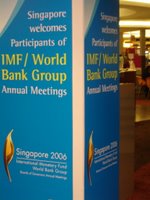 It’s my last day in Singapore, and I’m writing from an internet café as the facilities at the conference centre have all closed. We were very well looked after there and generally in Singapore – except in the crucial issue of some of us being harassed at immigration, with some not being allowed in at all. Once colleagues have been deported and you have been taken to one side at immigration, you begin to feel paranoid and are aware that many of those around you – for example among the prolific attendants whisking away your plates as you ate your last mouthfuls of a snack – were secret police keeping a check on what you were up to.
It’s my last day in Singapore, and I’m writing from an internet café as the facilities at the conference centre have all closed. We were very well looked after there and generally in Singapore – except in the crucial issue of some of us being harassed at immigration, with some not being allowed in at all. Once colleagues have been deported and you have been taken to one side at immigration, you begin to feel paranoid and are aware that many of those around you – for example among the prolific attendants whisking away your plates as you ate your last mouthfuls of a snack – were secret police keeping a check on what you were up to.
Speaking to us, the UK authorities all claimed to be outraged at some of the accredited delegates (such as our Co-Chair, Martin Powell) being excluded from Singapore. But, at a lavish (sponsored, apparently) reception the British High Commissioner kindly gave for all the Brits attending the meetings, both he and the Governor of the Bank of England, were fulsome in their praise of how well Singapore had run the events. In fact the Governor suggested they should always be held here. Not a hint of a hiccup and certainly not a mention that excluding and harassing people had occurred, destroyed many plans and badly tarnished Singapore’s image.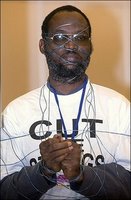 Our Cut the Strings! Protest (with us all tied up in strings and shuffling to the 20 square foot ‘protest pen’ in the conference centre) had tremendous media interest and coverage all over the world. Our Cut the Strings! Report, and the research report behind it, have both been very popular among civil society people at the Annual Meetings. I hope our campaigners will find them equally useful.
Our Cut the Strings! Protest (with us all tied up in strings and shuffling to the 20 square foot ‘protest pen’ in the conference centre) had tremendous media interest and coverage all over the world. Our Cut the Strings! Report, and the research report behind it, have both been very popular among civil society people at the Annual Meetings. I hope our campaigners will find them equally useful.
It was good to hear from the Finance Ministers of Ghana, Niger and Honduras at the press conference of the Finance Ministers of the Heavily Indebted Poor countries. They described some of their experiences. They noted, too, that the debt cancellation agreed at Gleneagles last year has been watered down so that the delivered cancellation excludes World Bank debts after the end of 2003 and they hoped this can be changed to at least those up to the end of 2004.
Yesterday Sustainability Watch launched their 2006 report. It was fascinating to hear firsthand accounts of the environmental damage linked to some World Bank and IMF debt. It was also a great chance to talk to Southerners who will give us some case studies for our Debt and the Environment paper due out later this year. And my final social event in Singapore was a MAKEPOVERTYHISTORY ‘banquet’ run by ONE (SINGAPORE). I was one of those (the majority) chosen randomly to sit on the floor and eat a small bowl of porridge. During the meal, some were promoted (from the poorest to the middle; no one moved up to the rich top table) and more moved down (from rich to middle and from middle to poorest), with good stories being told to highlight the issues causing poverty, which seemed new to many of those present. I think this awareness raising event was the first of ONE(SINGAPORE).
And my final social event in Singapore was a MAKEPOVERTYHISTORY ‘banquet’ run by ONE (SINGAPORE). I was one of those (the majority) chosen randomly to sit on the floor and eat a small bowl of porridge. During the meal, some were promoted (from the poorest to the middle; no one moved up to the rich top table) and more moved down (from rich to middle and from middle to poorest), with good stories being told to highlight the issues causing poverty, which seemed new to many of those present. I think this awareness raising event was the first of ONE(SINGAPORE).
To join, one has to pledge 12 hours of voluntary community work per year and to learn more about global poverty (including on trade, aid and debt) and to “take action to make poverty history worldwide”. But it was clear that such action is not likely in the foreseeable future to include any demonstrations, stunts, nor even petitions or letters. Once again, we were reminded of the repressiveness of this society and how cautious everyone is not to rock the boat. But the ‘banquet’ was a start and it is good that they feel part of the global movement marking White Band Day on 17th October: even if the only ‘Standing Up Against Poverty’ they can do is in groups of less than six, probably in their own homes!
Wednesday, September 20, 2006
Meanwhile in Alnwick...
 In the North East, we're just getting into the swing of the 'Roadshow' we're offering for the GCAP month of action, with a number of meetings throughout the region. In Alnwick on Monday, I tried to address the problem as to how we can "Stand up against poverty". I think people are exposed to two dangers.
In the North East, we're just getting into the swing of the 'Roadshow' we're offering for the GCAP month of action, with a number of meetings throughout the region. In Alnwick on Monday, I tried to address the problem as to how we can "Stand up against poverty". I think people are exposed to two dangers.
First, there's the danger of hypocrisy. I can think of nothing more repellent than for a person with a reasonable income to have strong views on economic justice, whilst grudging more than the spare change in his pocket for the world's poor. "Hard hearted and tight fisted to the poor", as the Hebrew Scriptures put it, they belong to what I rudely call 'the skinflint brigade'. But perhaps a greater danger is that of sentimentality – a sentimentality which contributes personally, even sacrificially, but is content to remain silent whilst the monstrous injustices of inherited and illegitimate debt and unjust trade rules grind down entire generations, across whole continents. These people belong to 'the sticking plaster brigade'. Surely the way forward is to combine a faithful relationship to one of our great aid agencies, with a vigorous and persevering commitment to campaigning for justice for the poor.
David Golding
University of Newcastle, and
Development Coordinator, Make Poverty History North East
The Beat Goes On in London
Christian Aid's 'Stop paying for poverty' march to the treasury last Thursday was particularly well-timed; not only did it kick off the Global Month of Action with a bang, the mood was 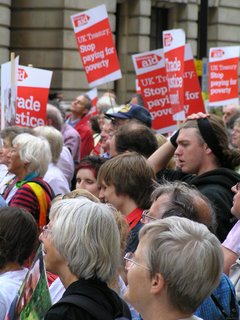 particularly buoyant as everyone was told about Hilary Benn's announcement, that the UK was withholding £50 million from the World Bank in protest over the conditions attached to international aid. (Of course, you could have read that story hours earlier, here on the blog, but anyway). As protesters gathered in the Geraldine Mary Harmsworth Park in Lambeth, we heard from Christian Aid's director, Dr Daleep Mukarji, and Christian Aid trade justice ambassadors, including Adjoa Andoh and Ibrahim Akalbila from the Integrated Social Development Centre (ISODEC) in Ghana, and singer Ronan Keating, who spoke about a visit there. Banners and placards showing the faces of people affected by World Bank and IMF decisions were displayed and distributed as the crowd got ready to move off.
particularly buoyant as everyone was told about Hilary Benn's announcement, that the UK was withholding £50 million from the World Bank in protest over the conditions attached to international aid. (Of course, you could have read that story hours earlier, here on the blog, but anyway). As protesters gathered in the Geraldine Mary Harmsworth Park in Lambeth, we heard from Christian Aid's director, Dr Daleep Mukarji, and Christian Aid trade justice ambassadors, including Adjoa Andoh and Ibrahim Akalbila from the Integrated Social Development Centre (ISODEC) in Ghana, and singer Ronan Keating, who spoke about a visit there. Banners and placards showing the faces of people affected by World Bank and IMF decisions were displayed and distributed as the crowd got ready to move off.
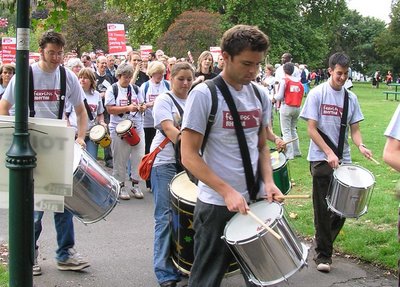
At the front of the group were the drummers, who taught the drummers in the crowd a Ghanaian message beat, and the speakers with a banner.
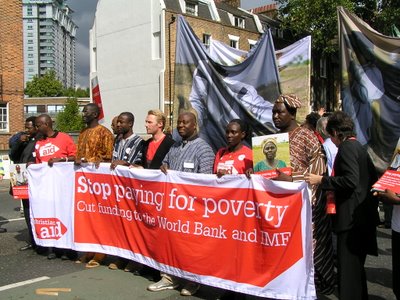
Following behind were about three thousand supporters, with placards, drums and banners, including representatives from groups such as Islamic Relief, Make Poverty History Jewish Coalition and Jubilee Debt Campaign. We walked from the park to Lambeth Bridge, and then made our way north towards the Houses of Parliament, the sound of the drums bringing many people out of their office buildings or to the windows to watch us pass.
After a minute's silence outside Downing Street, where a drum (symbolising the message being relayed by us from Ghana) and a petition with 25,000 signatures were delivered to Number 11, we moved on into Whitehall Place, where the rally ended with short speeches urging us to continue campaigning, and to take the stories we had heard back to our own groups and communities. The speaker from Senegal made the following sobering statement: "Over the last twenty years in Senegal, the IMF and the World Bank have done more harm than good. The IMF has stopped my government from helping me." A lot has been achieved, but we cannot stop now. The beat will go on...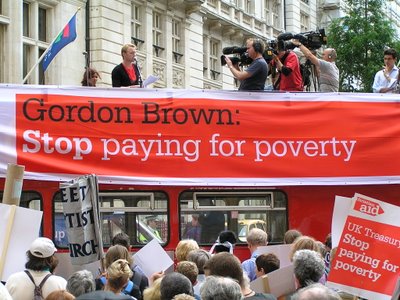
Posted by
Jubilee Debt Campaign, London
at
Wednesday, September 20, 2006
1 comments
![]()
![]()
Sunday, September 17, 2006
Who should be in the dock?
 The International Peoples' Forum in Batam (Indonesia) was bafflingly flooded by police this afternoon. I find it mind-blowing that people who are struggling to achieve economic justice for the world's poor are treated as criminals, whilst the Singaporean goverment - whose own police force has spent most of the day surrounding a tiny group of demonstrators who dared to appear in a group of more than five people, wearing t-shirts saying 'Democracy Now!' - has just been rated by the World Bank in the top ten of its 'good governance' listings.
The International Peoples' Forum in Batam (Indonesia) was bafflingly flooded by police this afternoon. I find it mind-blowing that people who are struggling to achieve economic justice for the world's poor are treated as criminals, whilst the Singaporean goverment - whose own police force has spent most of the day surrounding a tiny group of demonstrators who dared to appear in a group of more than five people, wearing t-shirts saying 'Democracy Now!' - has just been rated by the World Bank in the top ten of its 'good governance' listings.
The police here mostly hung around the entrance, but several did spend a long while copying the programme of events from a wall-chart into their notebooks. If only they had come into the Asian Peoples' Debt Tribunal, they would have heard a searing indictment of the policies of the World Bank and IMF, and clear calls for these institutions to be brought to justice. After the prosecutors and witnesses had had their say (the defence inexplicably failed to show up) the judges withdrew for consultation, returning to deliver a (hugely popular) guilty verdict.  The sentence included not only the policy changes for which we all advocate (debt cancellation, end to imposition of policies through conditions, etc), but also the rather more imaginative (and again hugely popular) instruction that the President of the World Bank and Managing Director of the IMF spend a year living amongst the world's poor, without the benefit of their Bank and Fund salaries.
The sentence included not only the policy changes for which we all advocate (debt cancellation, end to imposition of policies through conditions, etc), but also the rather more imaginative (and again hugely popular) instruction that the President of the World Bank and Managing Director of the IMF spend a year living amongst the world's poor, without the benefit of their Bank and Fund salaries.
It seems a timely suggestion for the World Bank President: he opened his statement at the "town hall" meeting with civil society on Friday by saying that when you live safely in five-star accommodation, it's easy to forget that billions of people live in poverty. Not the right audience for that admission, Paul.
Saturday, September 16, 2006
A Small Channel - but a Wide Gulf - Apart
 Greetings from Batam in Indonesia, where I’m at the International People’s Forum versus the World Bank and International Monetary Fund. Only a couple of hours and a few miles from the Annual Meetings of the World Bank and IMF in Singapore, but a world away in terms of perspective, priorities, and people’s experience. This event is being run by Asian civil society movements; the leaders of most events come from the region and the main concern is justice for the poorest people. I have attended interesting sessions linking World Bank and IMF debt to environmental devastation and linking their policies to appalling labour standards. We shall use some of this information at Jubilee Debt Campaign in our forthcoming Debt and… papers. The first ones should be out before the end of the year and we hope they will help people realise the devastating effects that unjust and unpayable debts have on the lives of hundreds of millions of ordinary people around the world.
Greetings from Batam in Indonesia, where I’m at the International People’s Forum versus the World Bank and International Monetary Fund. Only a couple of hours and a few miles from the Annual Meetings of the World Bank and IMF in Singapore, but a world away in terms of perspective, priorities, and people’s experience. This event is being run by Asian civil society movements; the leaders of most events come from the region and the main concern is justice for the poorest people. I have attended interesting sessions linking World Bank and IMF debt to environmental devastation and linking their policies to appalling labour standards. We shall use some of this information at Jubilee Debt Campaign in our forthcoming Debt and… papers. The first ones should be out before the end of the year and we hope they will help people realise the devastating effects that unjust and unpayable debts have on the lives of hundreds of millions of ordinary people around the world.
However, on one issue this Forum and the Annual Meetings across the water agree: the gesture yesterday by the Singapore government to allow 22 of their 27 banned accredited delegates to enter Singapore is too little (all should have been allowed, in accordance with the Host Government Agreement) and too late (already people have been humiliated, months of planning have been wasted and tremendous opportunities for dialogue have been lost). The suspicion over here is that the reason the World Bank and IMF chose the authoritarian regime of Singapore as host for the Annual Meetings was to shield themselves from protests and demonstrations. If so, the feeling is that they got what they deserved. But many of the World Bank staff have worked hard to make the civil society dialogue programme a success and are devastated by the waste of their huge expenditure of money, time and effort. Let’s hope lessons are learned, as it is crucial that we should work together and listen to each other if we are to make progress.
What a difference deportation makes
 Just a quick note to express my outrage at how activists, including debt activists, have been treated at these meetings. A few of us were on the bus home on Friday night when we caught news not only of our 'silent protest' but also of Singapore's decision to revoke its decision on some of the blacklisted activists. (Yes, the buses in Singapore have TV screens.) But as Trisha says, it's little and late: and it isn't anything at all for those who've already been deported. These include Maria Clara Soares, who is ActionAid's head of policy for the Americas and in charge of its international debt policy team, and also Kiama Kaara of Kenya Debt Relief Network (whose mother, Wahu, a long-term global justice campaigner, will be speaking at events in Manchester, Cardiff and London in late September). Those left on the blacklist include debt campaigners who we work very closely with, and who clearly haven't been responsible for riots in Geneva, Seattle, or anywhere else, whatever the Singapore government may say.
Just a quick note to express my outrage at how activists, including debt activists, have been treated at these meetings. A few of us were on the bus home on Friday night when we caught news not only of our 'silent protest' but also of Singapore's decision to revoke its decision on some of the blacklisted activists. (Yes, the buses in Singapore have TV screens.) But as Trisha says, it's little and late: and it isn't anything at all for those who've already been deported. These include Maria Clara Soares, who is ActionAid's head of policy for the Americas and in charge of its international debt policy team, and also Kiama Kaara of Kenya Debt Relief Network (whose mother, Wahu, a long-term global justice campaigner, will be speaking at events in Manchester, Cardiff and London in late September). Those left on the blacklist include debt campaigners who we work very closely with, and who clearly haven't been responsible for riots in Geneva, Seattle, or anywhere else, whatever the Singapore government may say.
Friday, September 15, 2006
Update from Singapore
 It’s all go here at the Annual Meetings of the World Bank and International Monetary Fund in Singapore, where friends have kindly lent us their flat, so we do not have to eat into JDC’s funds. In response to requests from partner organizations whose representatives have been refused entry, we are boycotting all official events. So that might have meant a relaxing time; I had wistful thoughts of the famous night safari at the zoo …. But meeting officials and fellow campaigners from all over the world, responding to enquiries from the press, making sure that the voices of our excluded colleagues are not forgotten, and planning together are all keeping us very busy.
It’s all go here at the Annual Meetings of the World Bank and International Monetary Fund in Singapore, where friends have kindly lent us their flat, so we do not have to eat into JDC’s funds. In response to requests from partner organizations whose representatives have been refused entry, we are boycotting all official events. So that might have meant a relaxing time; I had wistful thoughts of the famous night safari at the zoo …. But meeting officials and fellow campaigners from all over the world, responding to enquiries from the press, making sure that the voices of our excluded colleagues are not forgotten, and planning together are all keeping us very busy.
It has been encouraging during this activity to hear of Hilary Benn’s announcement that he will withhold £50 million of UK funding to the World Bank until they stop imposing harmful and undemocratic conditions attached to debt relief. At last the government is beginning to sound as if it might mean business. They must build on this with a more powerful message when the next tranche of funding is due. It really looks as if all those Cut the Strings! postcards and petitions are getting through. Well done, campaigners!
Caroline has written about the World Bank accredited civil society representatives who have been banned, subjected to lengthy interrogations and delayed. Months of planning and preparation have been wasted, some people have wasted huge amounts of time and money only to be sent straight home and others have been severely traumatized by their experiences at the airport before, eventually, being let in. Caroline has written, too, about this morning’s demonstration in our designated 20-foot-square ‘protest pen’, to get into which we had to swipe our passes and from which some would-be protesters were taken away for questioning before being allowed to join us. After the protest, once out of our ‘play-pen’, we were instructed to take off our GCAP T-shirts; it’s OK here to advertise Nike or one’s cleaning company on one’s chest, but not to advertise the slogan “Stand Up Against Poverty; We Must Have a Voice”.
The host country has a Memorandum of Understanding with The World Bank and IMF which makes clear that the host country must allow entry to all those who have been accredited to take part in the Annual Meetings. Getting such accreditation involves approval by one’s own government, as well as by the Bank. Singapore has blatantly disobeyed its agreement. Bank President, Ministers, officials and others are now vocal in their disapproval, but one wonders if they could not have done more in the last fortnight to prevent this happening and it seems there is no sanction to be visited on Singapore. The World Bank must ensure that future host countries allow free expression and the attendance of all those who have been accredited. There should be conditions attached to the agreement (aha; conditons are necessary sometimes!), such as a huge fine to be paid if the host reneges on the agreement.
We had always realized that there would be less scope than usual for civil society activities in Singapore, so there is a parallel event, the International People’s Forum, a half hour ferry-ride away in Indonesia. Tomorrow I plan to go there to join the hundreds of activists from around the world and learn more about their proposals. I shall learn more, too, how debt has affected them; one particularly interesting-looking session will focus on the links between debt and climate change. I hope I’m allowed back into Singapore!
Making our lack of voice seen
In a protest a couple of hours ago, activists all involved with the Global Call to Action against Poverty made a vivid demonstration of the lack of voice that poor people, their governments and the organisations representing them have at the 'World' Bank and 'International' Monetary Fund. (There's loads of coverage on the web if you want to see more.) Dozens of us stood in  silent protest with t-shirts and gags over our mouths declaring that these people have 'no voice' here. The point is a long-term one: conditions on debt relief and aid mean that poor people and their organisations and movements have no voice in discussions about economic policy; and the structure of the IMF and World Bank (where the 44 countries of sub-Saharan Africa have just 2 seats on the executive boards) mean that poor governments have no voice in the institution's decisions. (These points were made far more eloquently by our spokespeople, Besinati Mpepo from Zambia and Bishop Akolgo from Ghana.) And of course the bans, detentions and deportations happening right now (see below) bring the point home, as - even more than usual - many organisations campaigning for economic justice have no voice here this week.
silent protest with t-shirts and gags over our mouths declaring that these people have 'no voice' here. The point is a long-term one: conditions on debt relief and aid mean that poor people and their organisations and movements have no voice in discussions about economic policy; and the structure of the IMF and World Bank (where the 44 countries of sub-Saharan Africa have just 2 seats on the executive boards) mean that poor governments have no voice in the institution's decisions. (These points were made far more eloquently by our spokespeople, Besinati Mpepo from Zambia and Bishop Akolgo from Ghana.) And of course the bans, detentions and deportations happening right now (see below) bring the point home, as - even more than usual - many organisations campaigning for economic justice have no voice here this week.
It was probably the strangest protest I've been in. Given Singapore's rather unusual (to say the least) laws on protest and assembly, we had to check in and out of a designated 'protest area' with barcoded passes to enter. Initially about half a dozen or so of our colleagues were held back and not allowed into the protest. But at least the world's media were here and apparently interested. And we've done much better than our many colleagues - including leading debt activists, and almost all from the South, of course - who are even now being detained, questioned and deported, and who are very dramatically being denied a voice.
Thursday, September 14, 2006
Not in their gang

More and more news coming in about the bans on campaigners entering Singapore - so far we know of two campaigners from the Philippines who were deported immediately on arrival, and others being detained - including the former director of the School of Economics at the University of the Philippines, who now works for Social Watch, and three campaigners from ActionAid - one from Vietnam, one from Kenya and one from Brazil. Another campaigner from the USA was allowed in only on condition that she left straight for Indonesia.
The detainees are being held and questioned for, as far as we know, up to six hours. They are having their mobile phones taken away so they can't even phone colleagues to let them know about the situation. We're sitting here in Singapore wondering where people are - some arrive and tell us about their detentions, some are still missing presumed detained / deported / somehow banned.
In protest, we and at least 80 other organisations (and counting) are boycotting the official programme out here. Instead we are organising our own events, meetings and protests to draw attention to this further silencing of the voice of poor people and the organisations that work with and for them.
And you can see here the famous front page (see below) of yesterday's Strait Times - with another article from today about what campaigners are here for - at least in that one there is some recognition of the fact that we're here to get out a message about economic justice, not to bring chaos to Singapore.
Is the UK loosening strings?

Much excitement here just after 3pm Singapore time - messages started to come in from colleagues about an apparent UK announcement that it was withholding funding from the World Bank over the conditions attached to aid and debt cancellation. This is more or less what activists have been asking for recently in our cut the strings campaign: we (along with members, particularly Christian Aid and World Development Movement) have been telling the UK government to withhold funding from the World Bank and IMF until the harmful strings are cut. Campaigners have been emailing Hilary Benn and Gordon Brown and lobbying their MPs, and our new campaign report (coming soon...) spells out the demand clearly. Debt activists are today on their way to a march, organised by Christian Aid, which aims to take this message right to the Treasury and 'drum it home'.
When we calmed down and got the details, it was clear that it's not yet time to call off the campaign: the promise relates only to £50 million that the UK had already withheld from the World Bank until it took certain actions on reviewing conditions. But this is a response to campaigners: the UK is now asking the Bank to go further, and says it will make stronger demands when the next negotiations over funding start in the next couple of months. The actual 'demands' remain to be seen, but Hilary Benn said this morning on the Today programme on Radio 4* that he wants to see "evidence of practice changing" on conditions at the Bank. And also that "I don't think it's right that we should be telling other countries what to do." Our point exactly. But we still are - and the UK still needs to do more. But we do seem to be having an impact.
(*I can't get the link to work, but try visiting the Radio 4 /Today website to listen to the item from 8.10am this morning - a good long discussion about the rich world controlling poor countries both through conditions and by dominating the World Bank and IMF.)
News just in:
Apparently, 'The Straits Times', the main English-language newspaper in Singapore, is carrying the controversy surrounding the blacklisted reps as its top story. The article discusses the issue of the 28 people from eight different CSOs who have been banned from the annual meetings as "characters involved in disruptive activities in the past." It goes on to claim that there is "rising international criticism that Singapore is being too tough." (It's doubtful there'd be much dissent here). The tough stance on these so-called 'characters' is in direct contrast to the welcome banners up all around Singapore and there are fears that the hardline treatment of these reps - who, remember, had all been accredited by the World Bank and IMF - is likely to destroy most of the crucial civil society consultation programme.
Keep sending those emails to Gordon Brown to protest about the situation, and check back here regularly for updates. Use the 'Comments' link below if you have anything to say.
Posted by
Jubilee Debt Campaign, London
at
Thursday, September 14, 2006
0
comments
![]()
![]()
Wednesday, September 13, 2006
Drama in Singapore
 The month of action hasn't even begun, and already there's drama. Trisha and Caroline, JDC's crack lobbying team (and two of your bloggers-in-chief), are en route to Singapore, but it's not clear to us in London what the situation will be when they arrive. First the International People's Forum in Batam, Indonesia was cancelled, apparently following pressure from the Singapore authorities. Then, after what you could call 'a bit of a fuss', it was reinstated, although without the planned open air activities (which were to include a public concert).
The month of action hasn't even begun, and already there's drama. Trisha and Caroline, JDC's crack lobbying team (and two of your bloggers-in-chief), are en route to Singapore, but it's not clear to us in London what the situation will be when they arrive. First the International People's Forum in Batam, Indonesia was cancelled, apparently following pressure from the Singapore authorities. Then, after what you could call 'a bit of a fuss', it was reinstated, although without the planned open air activities (which were to include a public concert).
Alongside that, it emerged that there is a blacklist of civil society representatives who are being denied entry to Singapore, despite being accredited by the World Bank and IMF - and JDC's own Co-Chair, Martin Powell from WDM (that's him in the picture), is on it. You can email Gordon Brown in protest.
Campaigners are saying that the Bank and Fund should have seen this coming - and shouldn't choose to hold their meetings in countries with poor records on freedom of speech and assembly. "Three years ago, we went through a similar ordeal when the World Bank chose to have its annual meetings in the Emirate of Dubai," said Sameer Dossani of the 50 Years Is Enough Network. "It seems that the only countries where the IMF and World Bank feel secure are those with no respect for human rights and civil liberties."
See the WDM site for more, plus I'm sure there'll be further updates here soon.
Wednesday, September 06, 2006
Getting started
From mid-September to mid-October, debt activists and campaigners are going to be even busier than usual (although ‘usual’ is always busier than expected) and so we've created this space for people to share news, thoughts and comments on some of the activity going on around the world. For starters, the Global Call to Action Against Poverty (an international network of about 70 national campaigns for economic justice and equality, lots of them under the banners ‘Make Poverty History’ or ‘Keep Your Promises’) has called a global ‘month of action’ against poverty from 14 September to 17 October – also known as ‘Stand Up Against Poverty’. It’s kicking off with a range of different activities in countries around the world, and culminating in a global world record attempt for the number of people standing up together in protest. From 17 to 20 September, the World Bank and IMF are having their annual meetings in Singapore – and though they don’t let us in to the real meetings (and possibly not even the press conferences - watch this space), there are meetings-around-the-meetings (and protests-around-the-meetings) where campaigners make their views heard. Meanwhile, Asian social movements – along with like-minded networks and campaigns from around the world – are showing their resistance to the official shenanigans with an International People’s Forum vs the World Bank and IMF nearby in Indonesia, from 15 to 17 September.
So. Soren (and sometimes Njoki) will be blogging from Kenya, Singapore and Indonesia. I'll be blogging from Singapore, Indonesia and London. David will be blogging from Newcastle in the UK, and wherever else his campaigning takes him. Jostein (and his colleagues at AFRODAD, if he can persuade them) will be blogging from various parts of Africa. And we are trying to bring a few more friends on board during the month. We hope you’ll come back and read what we have to say, and give us your comments.
